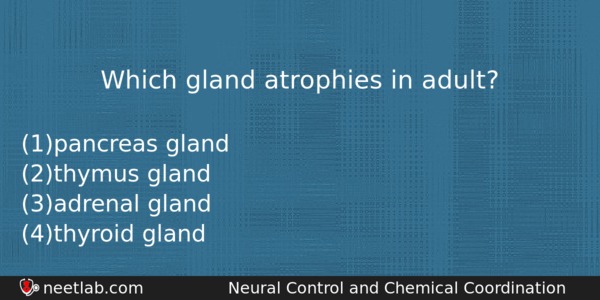| ⇦ | 
| ⇨ |
Which gland atrophies in adult?
Options
(a) pancreas gland
(b) thymus gland
(c) adrenal gland
(d) thyroid gland
Correct Answer:
thymus gland
Explanation:
No explanation available. Be the first to write the explanation for this question by commenting below.
Related Questions: - Nissl’s granules are found in cyton of nerve cells.These have affinity of basic
- One of the chief functions of smooth endoplasmic reticulum is
- Apomixis is the production of a new plant through
- Which of the following yield ATP during contraction of muscles
- End product of glycolysis is
Topics: Neural Control and Chemical Coordination
(195)
Subject: Biology
(4253)
Important MCQs Based on Medical Entrance Examinations To Improve Your NEET Score
- Nissl’s granules are found in cyton of nerve cells.These have affinity of basic
- One of the chief functions of smooth endoplasmic reticulum is
- Apomixis is the production of a new plant through
- Which of the following yield ATP during contraction of muscles
- End product of glycolysis is
Topics: Neural Control and Chemical Coordination (195)
Subject: Biology (4253)
Important MCQs Based on Medical Entrance Examinations To Improve Your NEET Score
18000+ students are using NEETLab to improve their score. What about you?
Solve Previous Year MCQs, Mock Tests, Topicwise Practice Tests, Identify Weak Topics, Formula Flash cards and much more is available in NEETLab Android App to improve your NEET score.
Share this page with your friends

Leave a Reply